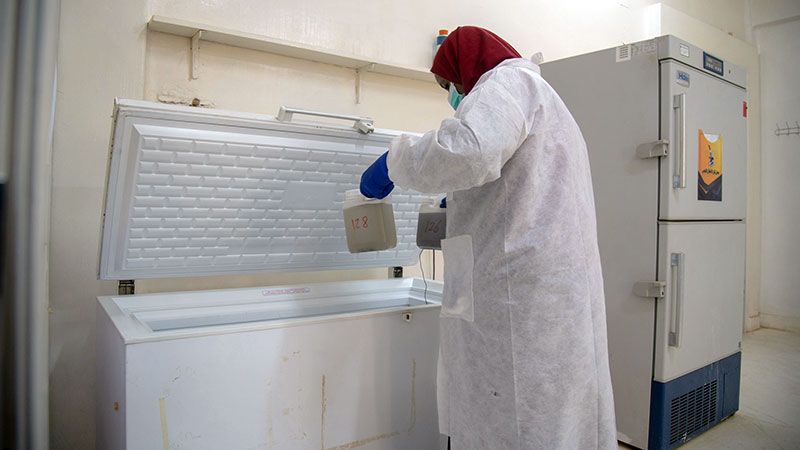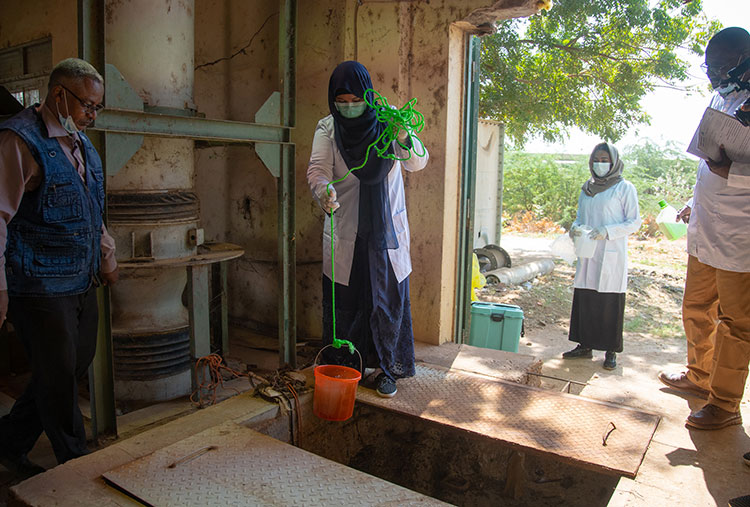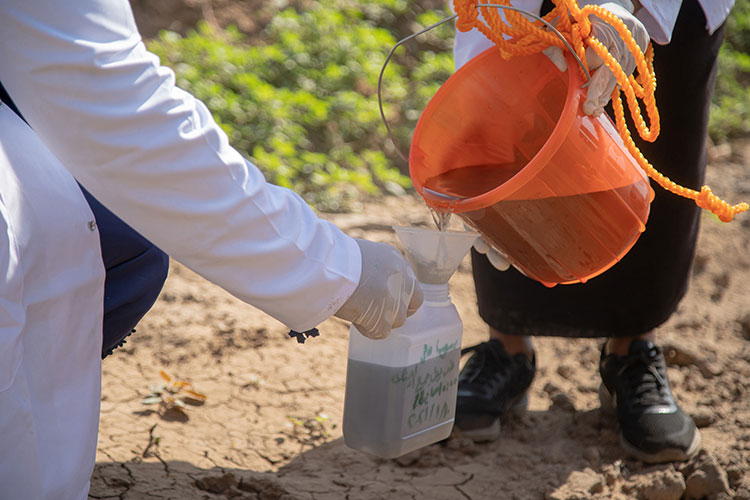30 November 2021 – Until last year, environmental surveillance for polioviruses in Sudan was confined to Khartoum State, the country’s capital. In the context of a circulating vaccine-derived poliovirus type 2 (cVDPV2) outbreak that has paralysed 58 children, collaboration between Sudan’s Federal Ministry of Health, the National Polio Laboratory and WHO colleagues across the Region has expanded the practice from five sites in this one state, to 14 sites in seven states.
 A Federal Ministry of Health employee collects wastewater samples from one of the environmental surveillance sites in Khartoum
A Federal Ministry of Health employee collects wastewater samples from one of the environmental surveillance sites in Khartoum
Environmental surveillance is the practice of testing sewage runoff for the presence of viruses and other pathogens. Depending on the immunity levels of children in any given community, poliovirus can circulate for a long time without paralysing a child, making environmental surveillance one of the Global Polio Eradication Initiative’s most important surveillance tools.
Sudan’s environmental surveillance expansion plan has brought the practice to West Darfur, North Darfur, East Darfur, Red Sea, White Nile and Gezira states – all areas with frequent mass population movement. With polio outbreaks in multiple neighbouring countries, it is crucial to enhance the surveillance measures in place to detect any importation and respond to it as quickly as possible.
 Between one and two litres of sewage runoff is poured into a labelled jerrycan. It is then sealed, wiped down and transported to the National Polio Laboratory in reverse cold chain
Between one and two litres of sewage runoff is poured into a labelled jerrycan. It is then sealed, wiped down and transported to the National Polio Laboratory in reverse cold chain
In the first half of 2021, the WHO country office, with support from the Central Surveillance Unit of the Federal Ministry of Health, led the expansion of the environmental surveillance network, giving the polio programme a whole new level of visibility over large parts of the country. Mr Hatim Othman, Manager of the National Polio Laboratory in Sudan played a major role in training state-level officers and district-level personnel on all aspects of environmental surveillance, including the collection of samples.
“The current cVDPV2 outbreak showed us the critical importance of environmental surveillance. It also gave us confidence in our ability to track the virus in the environment as well as in human beings,” said Dr Ni’ma Saeed Abid, the WHO Representative in Sudan.
Following a coordinated response, including two high-quality national vaccination campaigns, communication and education efforts and improvements to other programmatic areas, there has been no detection of cVDPV2 in 2021. The last case was a child whose paralysis had a date of onset of 18 December 2020 and the last positive environmental isolate was collected in Khartoum in November 2020. However, the risk of cVDPV2 transmission remains high as nearby countries continue to battle cVDPV2 outbreaks.
 A National Polio Laboratory employee in Khartoum stores an environmental surveillance sample for testing
A National Polio Laboratory employee in Khartoum stores an environmental surveillance sample for testing
“The expected formal closure of the outbreak in 2022 will be good news after a challenging two years, but the utility of Sudan’s increased ability to detect poliovirus in the environment will last long into the future,” said Dr Mohammad Taufiq Mashal, the Team Lead for Polio and Immunization at WHO’s Sudan country office.
“It’s critical to have effective environmental surveillance to maintain the polio-free status of Sudan,” he said.




